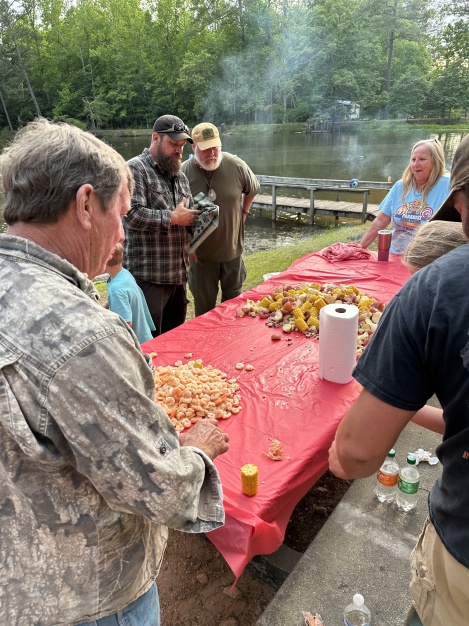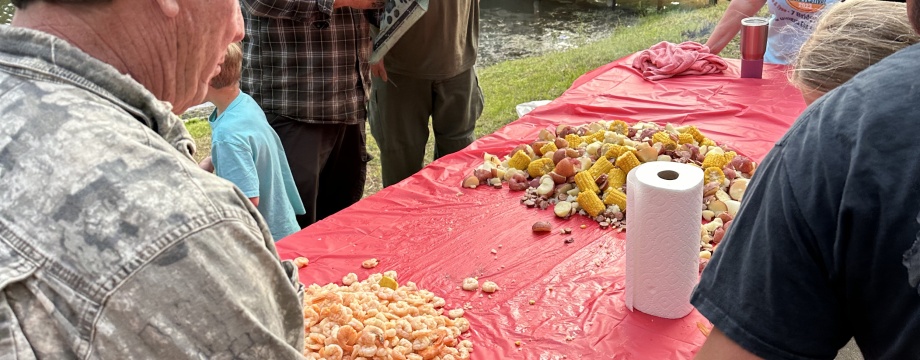by Todd Walker
Are you prepare for all the unknown unknowns?
No matter how meticulous you might be at creating your list of lists, how much stuff you’ve squirreled away, or how sharply you’ve honed your survival skills, you can’t fully prepare for the unknown unknowns. That’s why neighboring matters.
If you get 10 survivalists in a room, you’ll get eleven different opinions on how to build community. In this installment of my Individual Preparedness Plan series, we’ll discuss what should be on top of every person’s preparedness priority list: Neighboring.

Neighboring matters!
In the wake of Sandy’s unwelcome and devastating visit, I’ve noticed a pungent smell of superiority online from some (thankfully not all) “preppers”: “When will sheeple learn” and “We don’t look so crazy now, do we.” The back-patting party was furious in some cases. This kind of attitude and behavior only reinforces the negative stereotypical view of preppers being lunatics with guns and a superiority complex.
This got me wondering what our motives are in the preparedness community. We’re all in it for ourselves to some degree. Rugged individualism, self-reliance, independence, preparedness, back-to-basics, and sustainability are all noble pursuits. But what about those closest to us – geographically, not on social media sites? That nameless neighbor I wave to when checking my mail. He’s only two doors down. The older couple that I politely say hello to as they walk past while I’m on a run. I don’t know their names or situations, just that they live in my neighborhood.
Know Thy Neighbor
I often wonder how these nameless faces would respond to a natural disaster or extended SHTF scenario. What makes my middle class neighborhood different from those affected by Hurricane Sandy? Not a thing. Human nature is the same in New Jersey as it is in Georgia. We all need food, water, shelter, and neighbors… unless you live in an isolated cabin or cave in the hinter-boonies with wild animals as companionship. Then disregard this. For everyone else, your neighbors may unknowingly be your most valuable asset.
Got milk? No. Borrow it from your neighbor across the street. Uh, folks just don’t do that anymore. How about when a tornado rips through your town? Or an ice storm cripples the grid power? In these events, you realize a name goes with that passing face you wave to who now revs a chainsaw to saw through your driveway of fallen trees. When things go sideways, it’s what most (not all) humans do. Failure to build real relationships with real people will hamstring even those ‘super‘ preppers.
Intentional Neighboring
Isolation is intentional. So is neighboring. Which means more than pressing the “Like”, “Follow”, or “Friend” button for virtual friends thousands of miles from your computer. They won’t be able to pull your broken body from the rubble. They know you as an avatar on their screen. Real neighbors talk to you over your fence or share a drink around the backyard fire pit.
Our best hope of surviving catastrophe on a personal, local level is friends and neighbors. Daniel Aldrich, a political scientist living in New Orleans just before Hurricane Katrina hit, tells his story and study of response to natural disasters.
He had just moved to New Orleans. Late one August night, there was a knock on the door.
“It was a neighbor who knew that we had no idea of the realities of the Gulf Coast life,” said Aldrich, who is now a political scientist at Purdue University in Indiana. He “knocked on our door very late at night, around midnight on Saturday night, and said, ‘Look, you’ve got small kids — you should really leave.’ ”
The knock on the door was to prove prophetic. It changed the course of Aldrich’s research and, in turn, is changing the way many experts now think about disaster preparedness.
Officials in New Orleans that Saturday night had not yet ordered an evacuation, but Aldrich trusted the neighbor who knocked on his door. He bundled his family into a car and drove to Houston.
“Without that information we never would’ve left,” Aldrich said. I think we would’ve been trapped.”
“Really, at the end of the day, the people who will save you, and the people who will help you,” he added, “they’re usually neighbors.”
The Best First Responders
Family, friends, and neighbors help rebuild and restore order better than large organizations, government or otherwise. The more value-adding neighbors you have, (and not all wear the label “preppers”) the more hands, legs, minds, and overall resources become available. I sold my pickup truck this year to cover shortages in our family income when Dirt Road Girl could no longer work due to cancer. My across-the-street neighbor gave a standing offer to use his spare truck for any hauling duty that might come up. He and his wife have been so supportive to our family in our personal SHTF scenario. From meals, prayers, dog sitting, and just plain old neighborly stuff, they’re not just neighbors, they’re true friends now.
How Many?
Jesus maintained an intimate circle of twelve friends and only three in his inner circle. This number of face-to-face, close friends is about all mere humans can really manage. Any higher and we begin to spread ourselves thin. Keep in mind that this group is your real, trusted friends.
What about those outside this inner core? Dunbar’s Number sheds more info on manageable social group sizing. Dunbar theorizes that 150 is the mean group size for people. Of course, physical proximity to each other would either raise or lower that number. A lot of social grooming is required for this size group to stay intact. I can only count on one hand the number of intimate friendships I have. I think that’s healthy. From there my circle expands to close friends, friends, and acquaintances.
OpSec Concerns
What about OpSec (Operational Security)? I don’t divulge the full scope of our preparedness plans with every person on the street. That would be inviting trouble. DRG and I do have a small group of trusted friends that would run to our aid in the event of an extended event. They know we’d do the same for them. This type of friend is one that knows you, likes you, and loves you – warts and all. They know our plans because they’re part of our plan.
Building relationships with physical neighbors is mutually beneficial. The neighborhood preparedness quotient and survivability increases. A lone wolf can’t prepare for all the unknown unknowns.
Practical Stuff
Here are a few not-so-pushy ways to do this stuff. I guess you could canvas door to door. But you don’t want to come across as annoying. If you have an agenda other than being a good neighbor, folks will see through you. Keep it simple neighbor.
- Give: You’ve got carpentry, plumbing, electrical, or computer skills. Offer to help a neighbor. This opens a door for mutual and reciprocal giving.
- Get involved: Local farmers markets, festivals, concerts, school meetings are all attended by neighbors and friends.
- Yard sales: Don’t miss this opportunity to connect with people. As an added bonus, you’ll likely find useful stuff for your preps. Two weeks ago I scored a box of candles and mason jars from an older lady two streets down. I let her know where I live when I introduced myself. The transaction went very smoothly and I made a new friend.
- Share your Stuff: DRG makes killer sausage balls. She prepares a few plates every Christmas and delivers trays to neighbors. I share smoked Boston butt with a few as well. One of my neighbors samples my home-brewed beer.
- Ask for help – without being needy: That’s the only ice breaker needed to move from acquaintance to friend sometimes.
- Be a connector: Refer people needing stuff to people with the right stuff or skills.
- Trade stuff: One year I had a bumper crop of tomatoes while my next door neighbor produced more peppers than he could eat or cared to store. We traded throughout the summer.
- Barter stuff: If there’s a local barter network already established in your town, get involved and add value.
- Local clubs: Hunting, fishing, golf, knitting, or canning. Ask a neighbor to go learn a new skill together.
Hopefully these tips will motivate us to get out of the house, network, and meet your neighbors. Do you know your neighbors? They may be the missing link to the unknown unknowns.
Keep Doing the Stuff of Self-Reliance,
Todd
P.S. – You can also keep up with the Stuff we’re Doing on Twitter, Pinterest, Google +, YouTube, Instagram, and Facebook… and over at the Doing the Stuff Network.
P.P.S – If you find value in our blog, Dirt Road Girl and I would appreciate your vote on Top Prepper Sites! You can vote daily by clicking here or on the image below. Check out all the other value-adding sites while you’re there… 
Thanks for Sharing the Stuff!
Copyright: Content on this site (unless the work of a third-party) may be shared freely in digital form, in part or whole, for non-commercial use with a link back to this site crediting the author. All links in articles must remain intact as originally posted in order to be republished. If you are interested a third-party article, please contact the author directly for republishing information.








Reblogged this on Durable Faith and commented:
Sherpa expounds on how to love thy neighbor, great practical stuff, every prepper should read.
LikeLike
Durable, thanks for sharing it with your readers! and your kind words. Peace my brother!
LikeLike
Reblogged this on thesurvivalplaceblog and commented:
Add your thoughts here… (optional)
LikeLike
I applaud your post, well done friend. Neighborhood watch is always better than relying on the cops, and when TSHTF the watch is all you got.
LikeLike
Thanks, and really appreciate you sharing it on reddit and twitter! Neighborhood watch on steriods 🙂
LikeLike
You underestimate me! I also posted this to Facebook and Google+. Perhaps also StumbleUpon, can’t remember.
Keep the prepping gold comin’, amigo. 😉
LikeLike
You da man!
LikeLike
Pingback: Guest Post: Neighboring Matters: Preparing For Unknown Unknowns
Pingback: Protecting Yourself and Your Property After a Disaster « Survival Sherpa
Pingback: Top 5 Resilience Resolutions with Homework Assignments for 2013 « Survival Sherpa
Great post on networking and neighboring. Select carefully, I found out some things about our neighbors during a recent short lived surpirse “disaster”. Do not let non-prepper white middle and upper middle class wives be in charge when it hits the fan.
It was every woman for themselves with these priorities in mind:
1.Children’s confort
2.their comfort
3.everything else.
When moms network its via their kids. So guys do your own networking.
I know it sound sexist, I appologize for that. Its just a reaction from what I observed in my neighborhood.
Fortunately I have a lot of military and former military in my hood. Armed, check; knows how to run a security and convoy operations, check; understands team concept, check and can mentally go places most people cannot, check. (yes I’m prior service, scouts out!)
Lessons learned.
1. Don’t try to make people happy, do what is needed.
2. Go out talk to neighbors. See who needs help and organize packs/teams to get supplies and recon. (fuel, food etc..). Its more efficient and more secure than everyman for himself. Nobody messes with groups even if they are un-armed.
3.Most imprtant of all try to build trust in the team concept. Yes your family will get re-supplied, now go help clear this tree from a neighbors house. Hardest one to implement.
LikeLike
Good points. Thanks for sharing your experience. Resilience is built step by step, neighbor by neighbor, community by community.
LikeLike
Pingback: Resilience: Bloom Where You’re Planted « Survival Sherpa
Pingback: 5 Must Do’s Before the National Nipple Runs Dry | Survival Sherpa
Pingback: Preparedness Community: Individualism vs. Collectivism | Survival Sherpa
Pingback: Preparedness Community: Individualism vs. Collectivism
Pingback: Preparedness Community: Individualism vs. Collectivism | thesurvivalplaceblog
Pingback: The Top Ten Posts of Our First Year! | Survival Sherpa
Pingback: Monsanto Hopes You Prep Like Homer Simpson | Survival Sherpa
Pingback: Anti-Fragile Strategies for SmartPreppers | Survival Sherpa
Pingback: Anti-Fragile Strategies for SmartPreppers | The Daily Sheeple
Pingback: Random Acts of Prepping | Survival Sherpa
Pingback: Nick Saban’s One Secret That Every Prepper Should Practice | Survival Sherpa
Pingback: 4 Monolithic Myths About Bug Out Bags | TheSurvivalPlaceBlog
Pingback: The Top 8 Reasons You Need a Possum Mentality to Survive What’s Coming | Survival Sherpa
Pingback: 5 Tips for Epic Self-Reliance Skills | Survival Sherpa
Pingback: Plans Fail → Skills Endure | Survival Sherpa
Pingback: Plans Fail → Skills Endure | The Daily Sheeple
Pingback: Plans Fail → Skills Endure » RickMick
Pingback: Plans Fail → Skills Endure | TheSurvivalPlaceBlog
Pingback: 5 Tips for Epic Self-Reliance Skills | Ready Nutrition
Pingback: The Top 8 Reasons You Need a Possum Mentality to Survive What’s Coming - My Family Survival PlanMy Family Survival Plan